- Interviews
- Sam Clarkson (Englisch)
Interviews
Sam Clarkson (Englisch)
Gesprächspartner: Ingmar Böke
Sprache: 
Vom:
05.02.2010
Über
Sam Clarkson ist in seiner Funktion als Creative Director des neuseeländischen Indie-Entwicklers Areo einer der führenden Köpfe hinter dem FMV-Episodenformat Casebook, für welches er auch als Regisseur tätig ist.
Adventure-Treff.de: Hi Sam, it´s a pleasure to welcome you here. Please introduce yourself, and your functions in the Casebook development, to our readers.
Sam Clarkson: I am the co-creator of Casebook. I wrote the original game design document and I develop the stories with the writer. I also direct the film shoots and do the editing.
A-T: Please tell us about your company Areo, the philosophy that started it all and the long term plans of Areo.
Sam: Areo was founded because we were frustrated with the lack of innovation in the world of computer graphics. Every year computers get far more powerful, but the improvements in graphics are generally fairly subtle. My current video card is probably 50 times more powerful than one I owned 5 years ago, yet all I get for that is some extra polygons, some nice anti-aliasing and some fancy shaders. While polygon graphics have their rightful place, we thought that there must be another approach that could look more real and could be created faster - which is what our technology 'Areograph' is: a system for capturing and rendering real-life environments for use in video games. Casebook uses the first generation of the technology, and in the future there will be other genres of games to feature Areographed environments. We are not trying to compete with traditional polygon graphics, we are merely offering an alternative where realism is demanded, and the developer can't afford a giant 'art army' like the AAA big-budget games can.
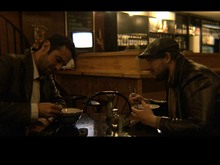
A-T: You´ve been working on countless documentaries for institutions like Animal Planet and the Discovery Channel. In fact one of the documentaries you´ve been involved in, was even nominated for an Emmy Award (who can claim that of him/herself?). Prior to that point you´ve made yourself a name as the director of repeatedly awarded local short-films. How exactly did you find your way into the computer industry, regarding your background, and how have your experiences been so far?
Sam: As a young man I set a goal for myself: I must make a film or a video game by the age of 30. Now it turns out I've accomplished both goals in one product – I would have never dreamed both my interests could go together in this way, but I've been very lucky. While I was making documentaries my friend Luke Reid (C.E.O. of Areo) was busy working on his crazy idea of creating a photorealistic rendering engine that would scan a real environment and have it ready for walking through inside your computer a few days later... Thankfully Luke and his brother Justin managed to make this invention work. It was then that we officially started the company. My job was to think of a game that would suit the restrictions of the technology and then to design and manage its creation. That game turned out to be a crime scene investigation game called Casebook.
I've really enjoyed working in the games industry (once you learn all the lingo!). Creating a series of episodic video games has allowed us to make some mistakes on the first episode, then see what the players and critics say, and do our best to improve the sequels. My favourite part of the job is the first time I get to play through a beta build and see how all the pieces - mini-games, video scenes, art, and voiceovers - fit together. It's an extremely fulfilling process.
A-T: Some of our readers may not be familiar with the Casebook series yet. Could you give them an idea of the concept that awaits them in Casebook?
Sam: I like to think of Casebook as more of a crime show, than a traditional video game. It's like a show where you get to step in and help solve the case. The player takes the role of a silent forensic investigator, alongside the star, Det. James Burton. The player collects and analyses the evidence, while Det. Burton interviews the suspects – together you solve the case. Casebook is like old-school FMV games in the sense that it shares a similar atmosphere to adventure games like the Tex Murphy series, but the gameplay is more streamlined, making Casebook accessible to casual gamers. Though we've discovered that it's the passionate adventure gaming crowd that have embraced Casebook more than casual gamers. Which makes me very happy because adventure games have always been my favourite genre. Monkey Island 1 & 3 are my favourite games of all time... in fact we have been talking to one of the co-creators of Monkey Island 3 recently about a potential new game we could make together... which would be a huge honour.
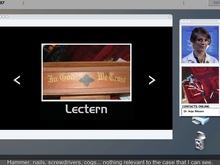
A-T: Probably one of the biggest challenges for games that want to appeal to casual gamers and adventure gamers is the level of difficulty. It´s obvious, how tough it is to find a balance that satisfies both groups and the Casebook series deals with exactly the same problem. How were the reactions you received on this issue from adventure gamers and casual gamers so far and how happy are you about the state of balance you´ve reached until now? Can you tell us some concrete ideas of how to further polish that balance in future projects in addition to the actual question?
Sam: The general response from the casual crowd has been that the navigation in Casebook is difficult (because they aren't used to FPS style movement) but the minigames and other aspects work well for them. Flip that over for the adventure crowd: they can handle the navigation but find the minigames and evidence sorting too simplistic and automated. We are still addressing the balance right now – we are working on a special edition of the trilogy which is aimed more towards adventure gamers. This includes a new and less automated evidence folder (which is more like a traditional inventory) and a couple of new minigames and a ranking system.
It's still a casual adventure game, but we hope the new features will make Casebook more appealing to adventure gamers... I guess the holy grail in the casual adventure game genre is to make a game that keeps both parties (both casual and traditional adventure gamers) happy, but realistically, I don't feel it's entirely possible. It sounds nice in theory, but personally I think it's like Hollywood trying to make a blockbuster film for everyone... ultimately it becomes too watered down and isn't a great film because you can't please everyone at once. For future projects I would prefer to focus on a game which has a specific audience in mind.
A-T: The technology in the Casebook series surely impressed a lot of players and reviewers around the globe, making people wonder how the whole thing with the photorealistic 3D environments actually works. Please give us some info on the technical creation of Casebook and the Areo engine.
Sam: Casebook used the capture process that we created called Areographing. Essentially it boils down to the worlds biggest flat-bed scanner turned upside down and placed on top of a film set. The camera is attached to a robotic arm and it 'scans' the entire set, capturing thousands of photos. These photos are then stitched together, ready to be placed into the Casebook engine so that the player can explore them. Each set takes about 2 to 4 weeks to build, then about 4 to 12 hours to Areograph, and finally, a day to process. After that it is placed inside Casebook and we must mark out all the hotspots – that is, the areas that are interactive.
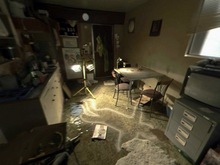
A-T: A new version of the Areo engine is being developed right now (Areo 2.0). What new possibilities will the new version offer and what restrictions of the past will it erase?
Sam: Areo 1.0 was limited to being indoors and the camera was attached to a huge ceiling robot. Areo 2.0 is basically just a camera which we can take outdoors and photograph whatever we like. The really sophisticated part of our technology is what you do with the photos once you have them. Areo 2.0 takes those photos and automatically generates a 3D mesh based on optical 'feature points' identified in the photos. Then the photos are placed back on top of the 3D mesh and what you end up with looks just like reality.Of course when you are dealing with the real world there are obstacles like weather and unwanted objects, so we have to wait for the ideal conditions for Areographing outdoors. At this point we are focusing the technology on linear environments, such as roads. This technology will either be used by our company to create our own driving game, or more likely, it will be licensed by another developer for use in their own driving game or hardcore driving simulator. After driving games we would like to expand into large outdoor environments that could be used in FPS, RPG and other free-roming style games and simulations.
A-T: Since the player remains invisible, his partner, advisor and friend Detective Burton, played by Julian Temple, became the distinctive figurehead of the Casebook games. How would you describe the important relation between the director and the lead actor in this case (especially on set)? And how do you see his development as an actor, keeping in mind that he started without any experience as an actor, and managed to give his character a strong profile.
Sam: It is essential that the actor and director trust each other. Julian trusts that I won't make him look stupid on screen and I trust that he will reveal the inner parts of his personality that make for a compelling screen character. I hope that Julian and I will have a long relationship together as actor and director. We are currently working on an action-adventure-survival film called 'The Pursuit' which we plan to shoot in 2011. I believe Julian has what it takes to be a great screen actor, as he has already demonstrated his natural instinct for acting in Casebook.

A-T: Speaking of Burton: He has taken quite a journey throughout the three episodes, revealing more and more of what´s under the surface of the cool and hard-boiled detective. Is there a chance you might give us a tiny idea of the road that´s in front of him, in case that you´re continuing the series?
Sam: Casebook was always intended to be a 6-part story divided into two distinct parts. In the first trilogy James Burton is a Detective, working within the system. Near the end of the first trilogy he starts working outside the law which gets him into some serious trouble... WARNING - SPOILER AHEAD: At the start of Episode 4 Burton has just opened his own Private Investigation Business. So Casebook fans can expect a different flavour to these stories where James Burton will have to deal with the reality that he can't hide behind a badge any longer. He will have to keep his wits if he is going to make it on the streets as a P.I. - but of course he will have the help of his always trustworthy forensic specialist... you, the player.
A-T: The ”Outtake-Video” for the free episode The Missing Urn doesen´t seem like you´re taking yourself more serious than you have to and that you´re actually able to have fun on set, despite of all the professionalism involved. Any funny anecdotes from the shoots that you can share?
Sam: Film shoots are a fairly high-pressure environment to work in, but we do our best to keep the atmosphere friendly and fun. I remember I felt really uncomfortable about tying up the children and putting tape over their mouths (in Episode 1: Kidnapped), but the kids actually found it very amusing! I played along and they put tape over my mouth too, which made directing them a challenge. I'll also never forget my first scene on Casebook. It was the interview scene between Det. Burton and the children's nanny Clara. Julian had never acted professionally in front of a camera before and I had never directed a filmshoot on this scale. Suffice to say, we were both a little nervous. But Julian turned up, knew all his lines inside out and knocked the scene out of the park. It was only later that I discovered that he had only just finished a huge tour with his band (The Julian Temple Band) and had a big night with his bandmates and then he'd had to drive all night to get back in time for the shoot... he barely had time to get a haircut, get in his suit and then he was in front of the cameras... playing Burton for his first time.

A-T: Do you see a realistic chance that localized versions of Casebook might find their way to Germany somewhen?
Sam: Certainly. We are in talks with people all over the world about localised versions. An Italian version is already out of Episode 1, and the Russian version comes out in early 2010. We'd like to see German, French, Dutch and Japanese versions out sometime in the near future too.
A-T: Actually the first season of Casebook was supposed to have six episodes. Parallel to the release of the third episode you have announced that the production is put on hold for the moment though, while you´re focusing on the marketing of the first trilogy (as you call it now). How satisfied are you with the sales at the moment and how optimistic are you that the fans of the series will be able to solve new cases together with Detective Burton?
Sam: It's true, Casebook was meant to have 6 episodes out by now, but production took much longer than originally planned and sales have meant that we need to put the production of episodes 4, 5 and 6 on hold for now. But as I mentioned earlier, Casebook was always conceived as having two distinct parts. So I'm quite satisfied with leaving Casebook where it is for now. Critically Casebook has been received really well, but sales have been disappointing...
However, we are quietly optimistic that the Russian version coming out soon will do some good business and we hope that we have the chance to do further localised versions, as we always tried to give the series an international appeal. At the very least I'm certain that Part 4 will be made eventually, because we have already filmed it and made all the crime scenes - so there's only the game production left, which doesn't require a huge amount of resource. My finger's are crossed that a bigger publisher (like say 'The Adventure Company') will pick up the Trilogy and release it as a retail boxed copy and that will go well enough to justify many more future episodes!
A-T: Is Areo working on the creation of another game (or series), despite of Casebook, at the moment?
Sam: At this point in time we are really focusing on our technology more than game production. But there is a chance that instead of licensing our tech out for a Driving game that we may make one ourselves. We'd certainly like to make the world's first totally photo-realistic driving simulator!
A-T: After the announcement of games like Under a Killing Moon and Phantasmagoria it seemed like interactive storytelling would be on the way to a totally new dimension in the 90’s. And while there were some great FMV games that indicated the enormous potential of FMV for mature storytelling, there were tons of crappy games out there and the original FMV era didn´t last long. How did you personally experience the rise and fall of FMV games back then? And what reasons do you see, from your personal point of view, that led to the demise of the original FMV era?
Sam: The three FMV games that really stuck in my memory are Space Ace, Under a Killing Moon, and a Star Wars FMV game which I forget the name of. The thing I found with them was that while I found the video scenes impressive I always found the interactive scenes jarring – the two elements were at odds with each other. That's why I got so excited when Luke said our game could have real environments, because I thought here was an opportunity to finally combine FMV elements with game environments that would match them. So to answer your question, I think the demise of FMV games was related to the fact that they seemed impressive initially, due to some of the high production values of the FMV in a few games, but ultimately the integration of gameplay left player's feeling cold. Of course there were some exceptions where the two were integrated quite successfully, but somehow this wasn't enough to convince studios that this was the direction to go in. Another factor is that developers like to work with the tools they are familiar with, and the introduction of alien elements like film shoots, actors, and digitised art assets could have been quite threatening to many game studios. Of course the rise of the almighty polygon meant that many developers focused all their attention in that area, which is understandable.
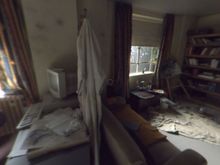
A-T: During the creation of Gabriel Knight 1: Sins of the Fathers, Jane Jensen made the following statement: “I try not to limit my thinking about the powerful nature of the story because it´s a computer game. I think that we can make computer games that are just as good as any other form of entertainment.” A long time has passed since that statement in 1993 and in terms of story-driven games it seems to me like Jane Jensen and a few others have proven this statement to be true, while the vast majority of adventure games seem to be miles away from that aspiration. What do you think: How much theoretical potential does this medium have as a mature story medium in terms of reaching a whole new audience and what kind of cultural acceptance could it reach under the right conditions, especially related to the aspect FMV?
Sam: I guess it's like any immature story telling medium. In the first 40 years of films there were countless films that didn't push the boundaries of film in any way whatsoever, that just cashed in on the popularity of films to make money, while a small selection of the filmmakers were responsible for all the innovation. I don't see games as any different. There are many mediocre storytellers working in all mediums (novels, animation, music, film, television) and games are no exception. Thankfully there are a few discerning creative individuals who want to innovate in their games and give players new experiences - they are just few and far between.
It's a nut that no developer has cracked yet, but personally I see no reason why FMV style games couldn't be a huge hit. I've never understood why they always turn TV shows (like C.S.I.) into a polygon game. Why not get the original TV directors to work hand in hand with some game developers and technical advisers and create a special interactive episode? Why must they be made like a traditional game with only a few elements from the TV series surviving the transition to the game world? I think it's really a case that the relationship between games studios and film studios is still in its infancy... in time this gap will close and the quality of FMV games will be closer to their TV/film counterparts and then they will be more celebrated and accepted by gamers and fans of the source material. I like to think that Casebook is a small step in this direction and I would like to see it taken further...

A-T: Before we come to an end, i´d like to dedicate some questions to your passion for directing: You often hear actors and directors talking about one key moment that made them realize they wanted to become an actor/director. What made you want to direct movies in the first place? Did you have such a special key moment, as described above, that opened your eyes at an early age? Despite of that: What directors and movies do you see as an influence today and/or what directors/ movies do you especially admire?
Sam: I'm not sure that I had a key moment of realisation that I wanted to direct. It was more that I simply loved watching films and it seemed natural to pick up a camera and make some. I made my first short film when I was 13, but it wasn't until a period from the age of 18 to 23 that I become serious about film. At that time I was obsessed with martial arts films - mainly Jackie Chan - so I made several kung-fu shorts which lead to a job in documentaries. I've always admired actors who also direct, guys like Clint Eastwood and Jackie Chan are incredible because of their skill to stand on either side of the camera. I don't feel like Jackie Chan ever got the credit he deserved for making what are essentially throwbacks to the silent comedy era - he's the only guy to continue the physical comedy of geniuses like Buster Keaton and Charlie Chaplin. The directors who most influence and inspire me would be: John Carpenter , Paul Verhoven, James Cameron, Ridley Scott, Sergio Leone, John Woo, Howard Hawks and Alfred Hitchcock. I like director's who make big, entertaining films, though I enjoy all sorts of films really. I find it especially important that the camera work is purposeful and sophisticated - don't just move the camera for the sake of it, there needs to be a good reason behind it... Lately I've been getting into Werner Herzog films, who is just a great, mad director... very inspiring. I'm also obsessed with Westerns, so I'm very keen to make one starring Julian Temple one day... I feel he has a bit of Clint Eastwood in him.
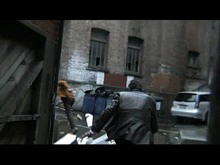
A-T: If you had the chance to choose any actors/actresses (no matter how famous and expensive) to work with, what names would come to your head?
Sam: Most of my favourite actors are old or dead by now. I love guys like Cary Grant, Jimmy Stuart, John Wayne, Lee Marvin etc... Having said that, and you might not believe this, but I would love the opportunity to direct Jean Claude Van Damme in a new, intelligent action film. After his semi-autobiographical film 'J.C.V.D.' I feel like he needs to follow up with some solid action films, and I would love to give that a shot. I'd love to cast Kurt Russell in my future Western as the bad guy - I thought he was great as the bad guy in Tarantino's 'Death Proof'. I've always had a soft spot for the 70's/80's comedian Gene Wilder too. I would love to do a film where he plays a nice, old funny grandfather... but I think he's retired now, which is a real shame. I'd also love to make a 'Back to the Future 4' as a game sequel to the film series, which would mean getting back Doc and Marty... that would be fantastic.
A-T: We´ve already touched the philosophy of Areo. Please tell us some details about your philosophy as a director and your personal approach to directing.
Sam: I'm still a young director who hasn't made a feature film yet, so my style is still becoming defined and I have much to learn. But I do have a few principles that I remain aware of as I direct. Firstly I have done a lot of editing and I feel it is my greatest strength. So whenever I am directing I am thinking about how the scene will cut together, it sounds so obvious, but it's easy to become lost on set and shoot far too much coverage (too many angles and too many takes) and then you end up with an unfocused collection of footage that you must 'save' in the editing room. I much prefer to establish what are the best angles and only shoot them - and try to not do too many takes because the performances become mechanical. I believe that the geography of the environment should be clearly established, particularly for action scenes. I hate nothing more than an action scene with shaky cameras and countless cuts. I prefer an approach with wide master shots, use of slow-motion, and smart editing. By smart editing, I mean that you must be conscious of where the human eye will be drawn to in each scene (an object, the actors eye, a bright light, etc) and where that attention will shift to in the subsequent shot. The viewer will become fatigued and angry if their eye must travel far between every cut.
I'm most comfortable with the technical side of directing, what I'm really still learning the most about is how to direct actors. I think an easy mistake to make is to feel that because you are called a 'director' it is your job to 'direct' actors all the time. But in reality, if you have cast the role well, a large part of your job is done. So if the actor is doing a great job, don't 'direct' them for the sake of it, just sit back, shut up and enjoy the show.
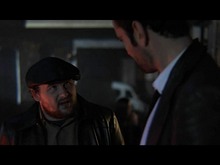
A-T: What can you tell us about the background of your planned movie The Pursuit at the close of this interview?
Sam: That film has haunted me for over a decade. I've always wanted to make an outdoor action-adventure-survival film, in the vein of John Boorman's classic 'Deliverance', but with more survival techniques being used. I first wrote the screenplay years ago when I was about 25, but I read it recently and it was terrible. I had tried to write about things I didn't understand (gangsters and drug smuggling) and so the script was totally cliche and unbelievable. I've since learnt that you need to write about things you understand if you expect the script to have a credible story and a sense of heart and soul under the surface. At the end of the day you have to create something that you yourself would like to watch, and I would love to watch this film. I hope it will come out sometime in 2011.
A-T: Thank you very much for doing the interview. We´d be glad to welcome you back for further interviews in the future, but for the meantime we´ll just wish you the best of luck with Casebook, The Pursuit and other projects.
Sam: Thanks very much for giving me the opportunity to discuss Casebook and the merge of games and film generally. I hope my answers weren't too long or boring... Cheers.
Aktuelle Artikel
![]()
Unterstützen
![]()
Adventure-Treff-Verein
IBAN: DE38 8306 5408 0004 7212 25
BIC: GENODEF1SLR
Bitte beachtet, dass wir leider keine steuerrechtlich anrechenbare Spendenquittungen ausstellen können.
Mit jedem Einkauf bei unseren Partnern unterstützt ihr die Arbeit des Adventure-Treff e.V.











